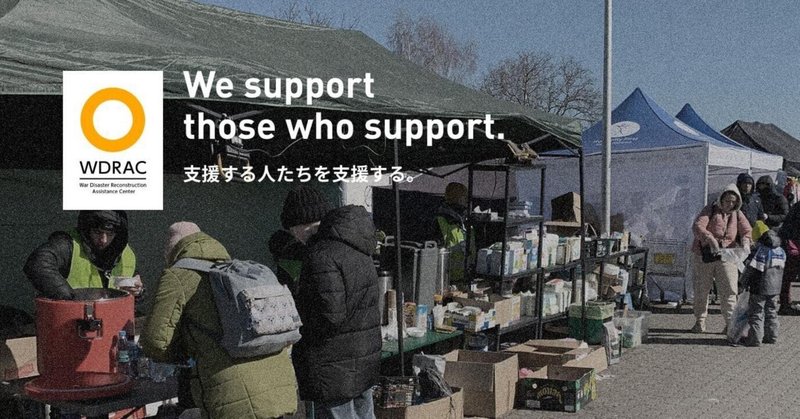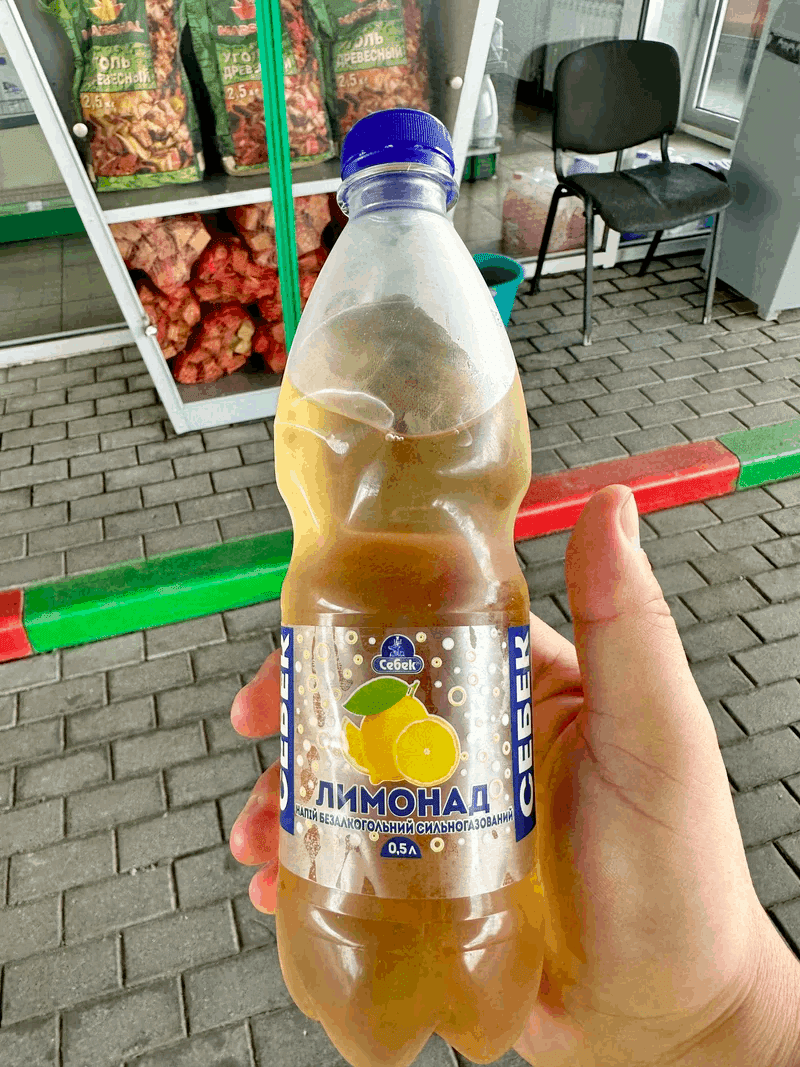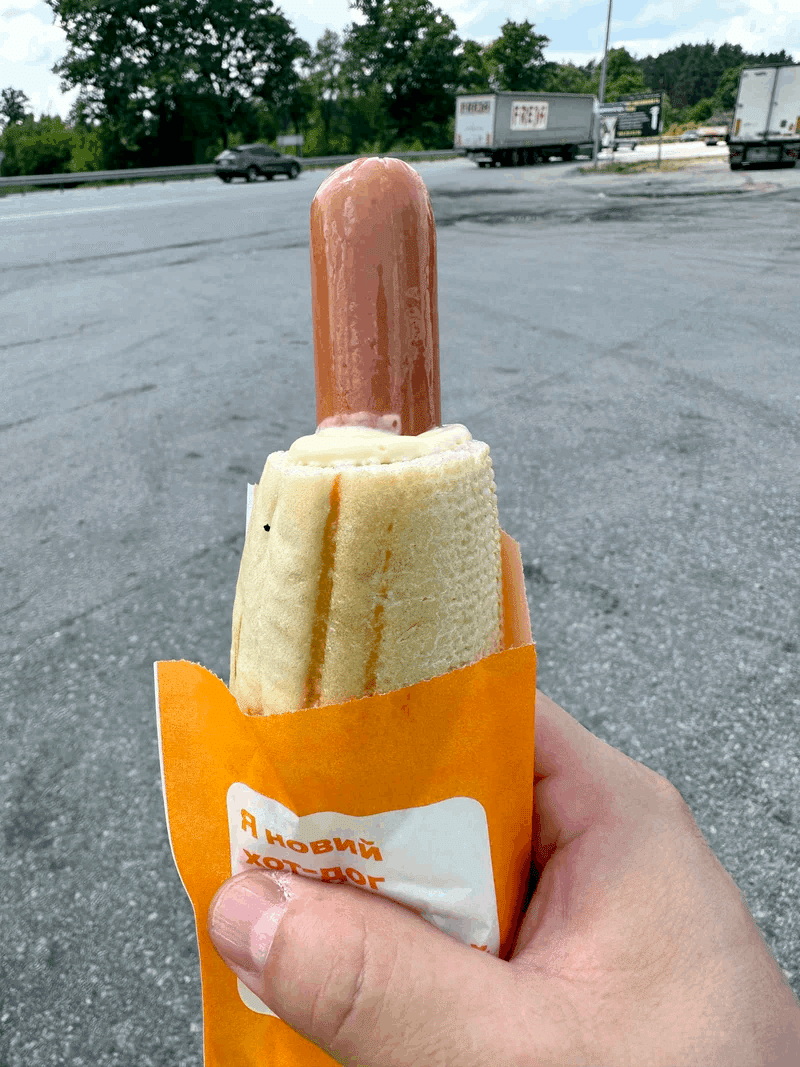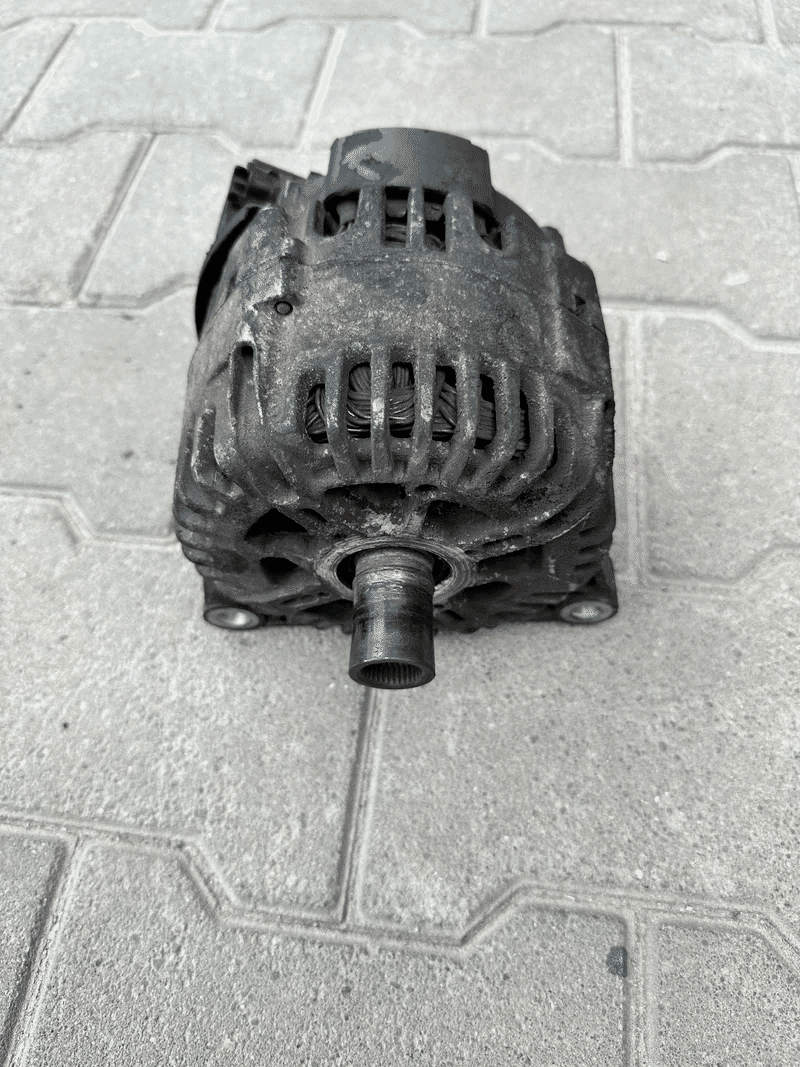
Day.3 June 15th, Rivne-Irpin-Lviv-Medyka
I wake up to the sound of dogs barking at 5 a.m.
Whether in urban or rural areas, there are many stray dogs in Ukraine.
Since they have collars, they are not stray dogs.
The room faced east, and the sky was beautiful with a reddish hue just before the sunrise.
The temperature is 10°C, and it's cold with just a T-shirt.
I take a shower and get ready.
Since tap water is not suitable for drinking, I brush my teeth with mineral water, just to be safe.
I go downstairs to the front desk to check out.
At 6 a.m., we gather at the car, and Simon and Travis have already started loading and unloading the luggage.
Today, our first destination is the orphanage in Irpin.
We refuel at a gas station and get some coffee.
The self-service coffee machine has instructions in Ukrainian, and I don't understand what it says. However, when I ask the staff in Japanese, "Excuse me, I don't know how to use this. Where should I press?" they respond in Ukrainian, saying, "The cup size is large. What would you like to drink? American coffee? Then press this." We manage to communicate.
Travis was laughing as he watched the situation.
We start moving.
About 70% of our activity of "delivering goods" involves driving, 10% unloading, 10% loading, and 10% organizing the cargo.
Today, we have a long journey of around 700 kilometers as we head back to Medyka.
Simon speaks British English, Travis speaks American English, and I speak basic Japanese English.
None of us can speak, read, or write Ukrainian or Polish.
I'd like you to watch the following video.
Simon had a device called "Pocketalk."
By the way, I had the app version of Pocketalk prepared, but I only used it twice.
Since February 24, 2022, the Russian military, advancing from Belarus towards Kyiv, engaged in intense urban warfare with the Ukrainian forces, using the Illbyny River as a defensive line. The fighting continued until the Russian troops retreated from Kyiv on April 3.
Dmytrivska is located 30 kilometers from the center of Kyiv. There were five destroyed tanks abandoned along the roadside.



We arrive in Irpin in the early afternoon.
It's a quiet residential area, with people walking along the streets.
There are people walking their dogs, carrying shopping bags, and riding bicycles.
The weather is sunny, the air is dry, and the sky is clear blue, creating a pleasant atmosphere.
It's hot in the sunlight, but it feels cool when we find shade with a gentle breeze.
This area witnessed ground battles in defense of the capital.
Using Google Maps as our guide, we make our way towards the children's orphanage, our intended destination.
As we navigate through the alleys and along an unpaved road, we start hearing unsettling sounds coming from the engine.
At first, it was just a slight unfamiliar sound, but it quickly escalated to a more concerning noise, making us realize that something might be wrong.
In situations like this, the first thing to do is to open the hood and take a look.
So, we open the hood and peer inside.
Even though we know it might be futile, going through the motions of checking various components is the correct initial response when dealing with unfamiliar noises.
Meanwhile, the car continues to emit the distinct and resolute sound.
Eventually, Simon discovers a mysterious tube.
"What's this? It's not connected to anything," he says.
Simon, you see, a loose tube like that wouldn't cause such a peculiar noise.
It can be very stressful when you don't know the cause of the problem. It's hot, we're not sure of our exact location, and we're feeling a bit lost, all while the car seems to be broken.
However, as seasoned professionals, people like us in our middle age don't easily get rattled by minor setbacks.
Even when it becomes clear that things are not going well, Travis continues to search for the destination, I keep a record of the situation, and Simon takes a sip of water.
Old-timers like us won't flinch at something as trivial as a broken-down car.
With the unsettling noise still resonating, we drive a few hundred meters and reach our destination. The staff of the children's orphanage greets us at the entrance, having noticed our confusion.
The facility consists of four buildings enclosed by a fence. They provide care for orphans from newborns to eight-year-olds, as well as offer day services for children with disabilities and their parents, and childcare services.
They warmly welcome us, saying, "Please come in and have a look around."
The staff members who assist us include an English-speaking administrative staff, a doctor, a nurse, and the director, totaling four individuals. In addition to them, there are about 20 staff members working at the facility.
We arrived at the orphanage just in time for snack time. The children were sitting politely, quietly enjoying their cookies.
As two burly, bearded men and another person (that would be me) entered the room, we enthusiastically greeted the kids with "Hello! Hi! Good afternoon!" I expected the children to cry or be startled, but to my surprise, they all wore expressions of curiosity and responded calmly, as if thinking, "Strange people have arrived."


We toured the facility and started unloading the support supplies. We brought fresh produce (potatoes, onions, cabbage, oranges, apples, bananas) from Shemyshe, as well as baby food and diapers.
To ensure that the donors are informed that the supplies are being delivered directly to those affected, we asked the staff members to take photos with the ABW panel. The ABW panel includes the logo of WDRAC as well.
After finishing our tasks, we were invited to the director's office where we enjoyed coffee and cookies as a snack. This orphanage, with a history of over 90 years, also became a battlefield.
The staff members shared with us the various hardships they had experienced. They passionately recounted their stories.
They mentioned sensing the signs of impending conflict in Irpin and evacuating with the children to the center of Kyiv for safety.
While the language barrier may indeed exist, as long as there is an intention to understand each other, there should be no problem.
There are 25 orphanages in the vicinity of Kyiv, each designated for different age groups. This particular facility accommodates orphans from 0 to 8 years old, with a majority of infants under the age of 1 being war orphans who have lost their parents.
The operation of the facility relies on government subsidies, donations from volunteers, and charitable activities.
The baby food and diapers we provided were greatly appreciated, as they were scarce in the vicinity of Kyiv.
The toddlers enjoying their snacks, the infants playing in the playroom, and the preschoolers having fun in the playground—all of their faces were filled with innocent smiles. They didn't show any fear towards us, probably because they were encountering an Asian person for the first time.
In one corner of the director's office, there was a picture drawn by a child who had grown up in this facility, depicting a Japanese anime. I wonder how our Japan is perceived by the child who drew this picture?
As I've grown older and gained various experiences, and fortunately had the privilege of having a family, I can now imagine both the feelings of a child who has lost their parents and the feelings of a parent who has lost their child.
If someone's close family members were killed by someone they didn't even know for political reasons, what actions would I take? What would I do if my wife and daughters were killed?
Although the answers don't come readily even when I contemplate, engaging with those who have actually experienced the loss of their family members keeps this question swirling in my mind.

We took commemorative photos with the staff and shared hugs before leaving the orphanage.
Our next destination was a house belonging to someone Simon knew.
It was a 5-minute drive, near the Irpin River, in an area that had been the frontline of the urban warfare. Bucha, where the massacre had occurred, was just across the street and less than 10 minutes away.
Although we had made prior arrangements, the residents were not present. It was a residential area with around 100 houses, slightly set back from the main road.

I observed the burned houses, the houses with countless bullet holes on their walls, and the houses that had been renovated and looked beautiful.
Having witnessed various natural disasters such as earthquakes, tsunamis, typhoons, and floods, I couldn't help but feel a sense of unease in this particular area. After observing for a while, I finally understood the reason behind this unease.
Natural disasters can devastate an entire area, but man-made disasters, especially warfare, do not necessarily destroy every building. It's a matter of whether they are taken away or left behind. I witnessed how war was dividing communities and leaving its mark on the surroundings.

The house with countless bullet holes on its walls.
This area witnessed ground battles between the Ukrainian and Russian forces until late March.


The remnants of the situation in this area from one year and four months ago still remain.
In order to prevent Russian military vehicles from entering the center of Kyiv, the Ukrainian armed forces and territorial defense forces destroyed multiple bridges over the Irpin River.
Although it has been one year and three months since the end of the conflict in late March, the bridges have not been restored yet.
We were about 15 minutes away by car from the central area of Kyiv, where the Independence Square (known for the famous Michael statue) and the War Museum's Motherland Monument (known as the Motherland statue) are frequently seen in the media. So, we thought, "Since we're already here, why not take a quick look?" However, perhaps it was the pride of seasoned professionals, we didn't allow ourselves to be distracted and wasted no time, instead continuing on to our next destination, the shelter in Lviv. Of course, the engine noise persisted.
The events that unfolded next would serve as proof of our earlier plea, "Please donate money for a new car." Please bear with me for a moment.
From P30 to E40, entering the freeway for about 1 hour and 30 minutes. Passing through Zhytomyr and with just 1 more hour to go until Rivne, the engine finally came to a stop.
Travis, who was behind the wheel, calmly stated, "The engine has stopped," and steered the coasting car to the side of the road.

However, a miracle happened to us. The car came to a stop at a place that was conveniently located beside a gas station.
WOG.
We found ourselves parked by a perfect gas station equipped with air conditioning, heating, a shop with restrooms, Wi-Fi, and power outlets. It was a remarkable stroke of luck, but it also gave us an uneasy feeling.
The miracles kept coming. As Simon headed towards the gas station, he noticed a car accessory shop with an attached garage next to it. He decided to inquire there, using his negotiation skills. After a short while, Simon returned to our van from the car accessory shop.
By the way, our van, an old Peugeot Expert with a mileage of 150,000 km, had a nickname. We called her Bettie. Since it's a feminine noun, we referred to the van as "she."
"We are to blame for pushing her too hard," Simon said. "We should have given her more kisses. Maybe we did more than just kissing, and that's why she fainted," he joked.
As we casually chatted, a man in camouflage clothing, riding in a beat-up car, approached us silently. He spoke in Ukrainian, so we couldn't understand his words, but at a soul level, I could sense what he was saying. According to him, he wanted to tow our van and was asking for a hook.
He turned out to be an auto mechanic. We didn't know his name since he rarely spoke. However, because he eventually brought us victory, let's call him "Victor."
Behind the gas station, about 200 meters away, was Victor's auto repair shop. He had received a message from the shop owner that Simon had negotiated with earlier.
Bettie was promptly towed to the repair shop. It was a little past 2 PM, and the weather was scorching hot, but the dry air provided some relief in the shade.
Victor silently opened the hood and peered inside without uttering a word.
The sky was wide and the air felt refreshing. The repair shop seemed to specialize in large trucks.

"Your alternator is broken. I'll replace it. I'll go get the parts, so wait here. It'll be done in 3 to 4 hours."
With those words, he left without a trace.

I suddenly realize I'm hungry. I haven't had anything to eat besides coffee and water since morning. Since it's going to take a while, I decide to go to WOG to get some food.
There's a stray dog with a collar following me.
The sky is blue, the clouds are white, and there's a moderate amount of traffic. Inside WOG, the air is cool, the lemon tea is refreshing, and the hot dog is warm.


I returned to the repair shop and since I had some free time, I decided to have an impromptu Zoom meeting with the team in Japan. We discussed how we should handle situations like this and also interviewed Simon and Travis.
Fortunately, the repair shop provided Wi-Fi access and had restroom facilities. I took the opportunity to catch up on emails and work-related tasks that had piled up. It was very convenient.
As Travis mentioned, we were truly fortunate. I couldn't help but think about what would have happened if it were nighttime, in a deserted area with no cellphone reception. In those moments, I found myself thinking, "Well, that would make for an interesting anecdote. We could just turn back and walk until it gets light." It's these kinds of thoughts that reflect our professionalism as a trio of middle-aged individuals.
After a while, Victor returned with a used alternator in his hands.
The alternator is a generator that uses the engine's rotation to charge the battery, but it can be damaged if it gets submerged in water.
Due to the rough road conditions we encountered, with numerous encounters of water puddles and potholes, and continuous exposure to strong impacts, the shaft of the alternator broke, causing the charging and storage of power to cease, ultimately resulting in Bettie coming to a halt.

While peering into the bonnet, Alexei, the young assistant (placeholder name), and I proceed to replace the parts. Without any instruction manual to guide us, we rely on our knowledge and experience to carry out the task.

And at 6:11 PM, Bettie finally comes back to life, her engine roaring once again.
The miracle continues. The engine starts, and the alternator has been replaced. We can finally return to Medyka. However, we can't just leave without settling the payment.
The topic of our conversation while waiting for the repairs centered around the cost.
"What should we do? We might get ripped off big time."
"But I don't think it'll be as much as 200,000."
"I don't know, they might ask us to leave our wallets and everything in the car."
We were throwing around various ideas and concerns about the payment. Then, Simon negotiates using the app for just a minute, and Viktor says this:
"4,000 hryvnias."
Wait a minute, let me do the math.
It's around 15,000 yen!
In Japan, it would easily cost 70,000 to 100,000 yen or more. But Viktor's explanation is this:
"You came from a distant country to help us. We have an obligation to help you in return. Helping you is connected to helping our fellow countrymen."
Viktor, a true man. He only charged us the actual cost of the parts, without taking any labor fees, understanding our situation, and completing the work without a single smile on his face. We expressed our gratitude to Viktor and his team, and then left the repair shop with respect.

The revived Betty is greeted by the evening sky, as if celebrating her recovery. The sun slowly sets on the horizon, painting the sky in shades of vermilion.
At 10:30 PM, we arrived in Boryslav, located north of Lviv.
A retreat center operated by a church is being used as a shelter, accommodating around 50 people. Despite the late hour, the volunteer leader and the evacuees themselves assisted us in unloading the supplies.
With this, we have successfully distributed all the relief supplies for this mission.
After leaving Boryslav and passing through Lviv, we returned to M11 and arrived at the Polish border a little after midnight. There was a queue of vehicles here as well, but the number of cars was not too high, and we were able to pass through the border in about an hour.
Travis went to retrieve the other van parked in a parking lot near the checkpoint. It was lent to another organization that was also working in Medyka, but they hadn't returned it for over three months. Simon informed us that they had left it parked here. It reminded me of a similar situation that occurred in Ishinomaki back in 2011.

After submitting our passports and going through vehicle and document checks at the Ukrainian checkpoint, we proceeded to the Polish checkpoint. We submitted our passports again and went through the same process of interior and document checks. Finally, we made our way back to Medyka.
As we arrived at 84, we noticed that there were still around 30 refugees gathered in the area, as before.
It was already 1 a.m., and we were finally done with today's work. I suddenly realized that I hadn't eaten dinner, but I decided to take a shower and crawl into bed. Travis had also returned at this point.
この記事が気に入ったらサポートをしてみませんか?
